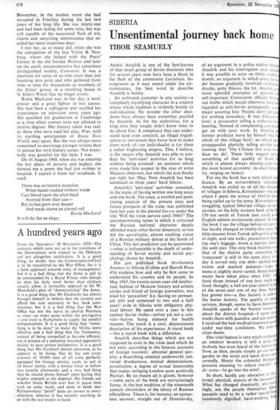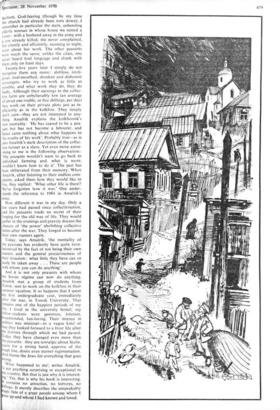SIBERIA
Unsentimental journey back home
TIBOR SZAMUELY
Andrei Amalrik is one of the best-known of that small group of Soviet dissidents who for several years now have been a thorn in the flesh of the communist Leviathan. In4 congruous as it may sound under the cir- cumstances, the best word to describe Amalrik is bolshy.
An awkward customer in any society—a completely mystifying character in a country whose whole tradition is violently hostile to individualism. No wonder the other dissi- dents have always been somewhat puzzled by Amalrik. As for the authorities, for a long time they simply didn't know what to do about him. A conspiracy they can under- stand (and even concoct), an illegal organi- sation or movement they know how to make short work of—an individualist is for them a rather frightening enigma. This, I believe, is the reason why Amalrik was able to con- duct his 'anti-state' activities for so long without being arrested: an omission which even made him suspect in the eyes of some Western observers, but which the KGB finally put right last May. Now Amalrik has been sentenced to three years' hard labour.
Amalrik's 'anti-state' activities consisted, in the main, of having written one long essay and one book. The essay, a morbid and pene- trating analysis of the present state and future prospects of the USSR, was published here last year in the journal Survey under the title 'Will the USSR survive until 1984?' The uncompromising terms in which it criticised the Russian national character deeply offended many other Soviet dissenters; so too did the apocalyptic, almost exulting vision of a Russian military defeat at the hands of China. This last prediction can be questioned —what is indisputable is the depth of under- standing of Soviet society and social psy- chology shown by Amalrik.
His just published book Involuntary Journey to Siberia (Collins and Harvill Press 45s) explains how and why he first came to understand his country and its people. In May 1965, the twenty-seven-year-old intellec- tual, habitué of Moscow literary and artistic circles and friend of foreign journalists, was tried for 'parasitism' (i.e. having no perman- ent job) and sentenced to two and a half years' exile in Siberia with obligatory phy- sical labour. He spent over a year in this curious Soviet limbo—unfree yet not a con- vict—before being released for health reasons. The result is a cool, dispassionate description of his experiences. A travel book —but a travel book with a difference.
Amalrik describes things which are not supposed to exist in the USSR (and which do not exist, according to the fatuous accounts of foreign tourists): abysmal general pov- erty, a flourishing criminal underworld, uni- versal drunkenness, mutual denunciations, prostitution, a degree of sexual immorality that makes swinging London seem positively Puritan. By no means all is gloom, however —some parts of the book are excruciatingly funny, in the best tradition of the nineteenth century chroniclers of the idiocy of Russian officialdom. There is, for instance, an uproar- ious account, straight out of Dostoievsky, of an argument in a police station betw Amalrik and his interrogator over whe it was possible to exist on thirty roubles month, an argument in which every bys der became gradually involved—policem, drunks, petty thieves, the lot. Amalrik giv some splendid examples of ignorant a self-important Communist officials blurb out truths which would otherwise have regarded as anti-Soviet propaganda: a major assuring him 'People don't get jai for nothing nowadays. It was different fore'; a prosecutor telling a collective fa meeting, 'Instead of complaining you shou get on with your work. In America farmer produces more by himself than whole of this village here'; an official propagandist gleefully telling another meeting that 'The Chinese live even wo than we do'. These little nuggets cons something of that quality of Soviet which is almost always missing even fr the most honest accounts: its sheer fare ity, verging on lunacy.
For me the book has a very special si ficance. By an extraordinary coincid Amalrik was exiled to, of all the thousa of villages in Siberia, Krivosheino—the p where I spent the winter of 1942-43 befo being called up to the army. Krivosheino is straggling, typical Siberian village cut up ravines, on the hilly western bank of the 150 km north of Tomsk (not south, as English edition erroneously states). As I the book I see the village before me again. has hardly- changed in twenty-five years. little steamer from Tomsk still arrives at d of night, and one walks, precariously bala ing one's luggage, down a narrow plank the unlit pier. The only brick building is that of the district party committee. 'restaurant' is still in the same place; in day it served only one dish—pickled mu rooms and mashed potatoes—toda menu is slightly more varied. Some impro ments have taken place since 1942: th food shops instead of one (not much r. food, though); a full ten-year school in t, of the seven-year one of my time. Indus has grown too—a flax factory is added the butter factory. The quality of tiled services, though, seems to have deteriorat. Amalrik speaks of the 'horror stories I about the district hospital—I spent so weeks there with jaundice, and can attest I received the best medical treatment posit under war-time conditions. We even clean sheets.'
One vital feature is very much unchang an outdoor lavatory is still a great ra (nobody has even heard of the indoor Now, as then, people simply go out into
.
garden or the street and squat down un, cernedly. Hence the colourful Russian pression meaning 'to relieve oneself': do vetru—'to go into the wind'. In short, hardly any alteration in the ternal, physical, aspects of the peasants What has changed drastically, and hor ingly, are the people themselves: Sibe peasants used to be a rather special hr immensely dignified, hard-working, ho
taciturn, God-fearing (though by my time the church• had already been torn down).\ I remember in particular the stern, unbending elderly woman in whose house we rented a room: with a husband away in the army and a son already killed, she never complained, but silently and efficiently, morning to night, went about her work. The other peasants
were much the same; unlike the cities, one never heard foul language and drank with them only on feast days.
Twenty-five years later 1 simply do not recognise them any more: shiftless, irreli- gious, foul-mouthed, drunken and dishonest scroungers, who try to work as little as possible, and what work they do, they do badly. Although their earnings in the collec- tive farm are unbelievably low (an average of about one rouble, or five shillings, per day) they work on their private plots just as in- efficiently as in the kolkhoz. They simply don't care—they are not interested in any- thing. Amalrik explains the kolkhoznik's new mentality: 'He has ceased to be a pea- sant but has not become a labourer, and hence cares nothing about what happens to the results of his work'. Probably true—as is also Amalrik's stark description of the collec- tive farmer as a slave. Yet even more aston- ishing to me is the following observation: 'The peasants wouldn't want to go back to individual farming and, what is more, wouldn't know how to do it'. The past has been obliterated from their memory. When Amalrik, after listening to their endless com- plaints, asked them how they would like to live, they replied: 'What other life is there? We've forgotten how it was.' One under- stands the reference to 1984 in Amalrik's essay.
How different it was in my day. Only a few years had passed since collectivisation, and the peasants made no secret of their longing for the old way of life. They would gather in the evenings and gravely discuss the chances of 'the power' abolishing collective farms after the war. They longed to become their own masters again.
Today, says Amalrik, 'the mentality of the peasants has evidently been quite revo- lutionised by the fact of not being their own masters and the general precariousness of their situation : what little they have can so easily be taken away . . . These are people with whom you can do anything'.
And it is not only peasants with whom the Soviet regime can now do anything. Amalrik met a group of students from Tomsk, sent to work on the kolkhoz in their summer vacation. It so happens that I spent my first undergraduate year, immediately after the war, in Tomsk University. That remains one of the happiest periods of my life. I lived in the university hostel; my fellow-students were generous, tolerant, roadminded, fun-loving. Their- interest in politics was minimal—in a vague kind of way they looked forward to a freer life after he horrors through which we had passed. oday they have changed even more than he peasants: they are nostalgic about Stalin. earn for a strong hand, approve of the °ugh line, desire even sterner regimentation. nd blame the Jews for everything that goes
rong.
'What happened to me', writes Amalrik. s not anything surprising or exceptional in Y country. But that is just why it is interest- ng. Yes, that is why his book is interesting. t contains no atrocities, no tortures, no Wings. It merely describes the unspeakably gic fate of a great people among Whom I ew up and whom I had known and loved.















































 Previous page
Previous page